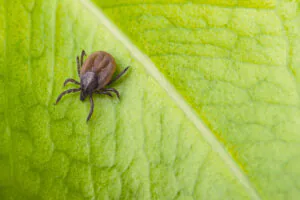Pet Allergies: Causes, Symptoms and Treatments

Just like people, our pets can have allergies as well. Allergens can be inhaled (such as pollens), ingested (such as food allergies), or come in contact with (such as carpet fibers). And depending on the type of allergy, your pet may exhibit different symptoms.
What are the allergens that affect our pets?
There are numerous substances that can act as allergens. Flea saliva, tick saliva, tree pollens (cedar, oak, ash), flower pollens, grasses and weed pollens (ragweed), as well as molds, mildew, and house dust mites, are the most common allergy offenders. Some plant and animal proteins found in foods can cause allergies as well as some food additives. The most common cause of allergies in our pets is fleas and the least common cause of allergies is food. Up to 80% of our pets with allergic dermatitis are very allergic to fleas so flea control is absolutely essential in the allergic pet.
What are the signs of allergic dermatitis?
The most common sign of allergies is itching of the skin – either in one area or generalized over the body. Itchy signs can include chewing and licking of the feet, rubbing or pawing at the face or eyes, rubbing the head or ears along the carpet or sofa, rubbing the belly or rear on the floor, and redness of the skin in the affected areas. Many pets will lick their armpits, thighs, belly or abdomen. Scratching at the ears or ear flicking and head shaking is also indicative of allergies. The constant scratching and licking can result in a secondary bacterial skin infection. Other signs of allergies may also include reoccurring ear infections, full anal glands, and anal gland infections. Most pets will start showing allergy signs between one and three years of age. Initially, many allergies will occur seasonally when the allergen is at its peak. But each year, the allergy season starts a little earlier and lasts a little longer and the allergies worsen. Eventually, with time, allergic dermatitis can become year-round. Allergens such as house dust mites, molds and mildew are present any season and pets sensitive to these will suffer year-round.
What are some of the treatments?
- ALLERGY TESTING & DESENSITIZATION THERAPY: This is the gold standard for a patient with allergic dermatitis. Your pet may either be skin tested or have blood drawn for an allergy test. The skin test involves injecting diluted allergens into your pet’s skin and looking for a flare skin reaction. The blood test is done in a specialized laboratory. The test looks for blood levels of IgE in response to antigens. Most allergy testing is done in the winter when your pet is no longer receiving medications. Once it is determined what your pet is allergic to, an allergen-specific immune serum can be compounded. This serum will have low levels of antigen that your pet will be exposed to by injections over a period of time – in effect desensitizing your pet to the allergens. Overall, desensitization improves allergy symptoms in about 50% of patients and the results can be very gratifying.
- BATHING: Frequent bathing helps physically remove irritants that are on the surface of your pet’s skin. Bathing also helps control and removes infection causing bacteria from the skin. Some pets need be bathed weekly. It is very important to use a high-quality, hypoallergenic or medicated shampoo that will not dry out or irritate your pet’s skin when used regularly. Be sure to thoroughly rinse your pet after its bath. Your veterinarian will recommend the best shampoo and the best bathing schedule for your pet.
- ANTIHISTAMINES: Antihistamines work the same in our pets as they do for us. By decreasing the release of inflammatory mediators, antihistamines help alleviate the symptoms of allergies. Despite the few side effects, antihistamines are relatively safe to use on a daily basis and are most effective when given prior to and regularly through the allergy season. The biggest benefit to using these medications is that it allows us to avoid using steroids or allows us to use a lower dose of steroids.
- STEROIDS: Steroids are used when the above therapies are not effective or the allergies are so severe that the patient needs relief. Steroids are often used to help a patient survive through allergy season until allergy testing and desensitization therapy can be initiated. Steroids basically turn off the over-reactive immune system. Steroids do have side effects some of which can be serious. The most common side effects are increased thirst and urination, increased appetite and weight gain. There are two basic forms of steroids. There is an injectable form and a pill form. The injectable form can last in your pet’s system for 2 to 3 months. The tablet form usually lasts for about a day. It is safer for your pet to be on the oral tablets at a graduated, tapered dose. The injectable form is used when your pet’s allergies are so severe that immediate relief is needed. Steroid treatment is a serious therapy that requires close attention by your veterinarian.
- FLEA CONTROL: No amount of allergy treatment in the world will relieve your pet’s itching if your pet has fleas. As stated earlier, 80% of our pets with allergies are also allergic to fleas. It may take only one or two flea bites to cause an allergic reaction in your pet. One flea is one flea too many for a pet with allergies. Flea control is essential for an allergy patient.
The best way to treat allergies is to individualize the treatment to your pet and to treat that patient with the lowest dose or frequency of medication possible because allergies are a lifelong problem. Eventually, your pet may need medication daily to control its allergies so starting with lower dose therapy initially will be of benefit. Keep in mind that some animals will respond better to different aspects of the therapy than others and some therapies may not work at all. Also, remember that allergies are controlled and not cured.
Keep in mind that each allergy patient is different and each treatment will be individualized to that pet. Some therapies will work better than others for different pets. Close communication with your veterinarian is essential in keeping your allergy pet as comfortable as possible.
Share This Post
Recent Posts
About Shallowford Animal Hospital
Shallowford Animal Hospital and The Pet Spa at Shallowford are dedicated to the exceptional, compassionate care your pet deserves. Pets hold a very special place in our families, and we treat yours like our own.



